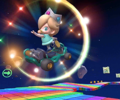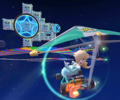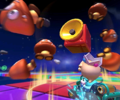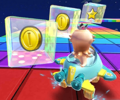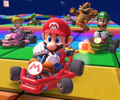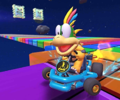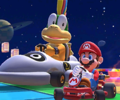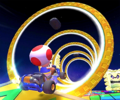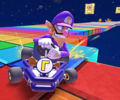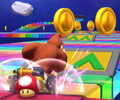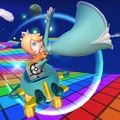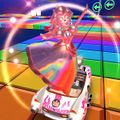Template:Racecourse
The original Rainbow Road debuted in Super Mario Kart, as the last course of the Special Cup, starting the Mario Kart series tradition of having Rainbow Road as the last course of the final cup. It is the shortest Rainbow Road to date, and it is the most common classic course in the series, having appeared seven times in different games, more than any other Mario Kart track.
This course is unique in Super Mario Kart in the fact that it is the only track in the game that is not numbered compared to the others, and thus it is the game's only unique track. It is the only track in the Special Cup with normal traction, but lacks rails entirely and has only 90-degree turns. Rainbow-colored tiles and a few jumping bumps cover the track's surface, and the yellow tiles conceal Coins. This course features Star Thwomps which can wipe out a racer by touch, unlike regular Thwomps, as well as by crushing, unless the racer uses a Super Star or a Boo.
In Mario Kart: Super Circuit, the Rainbow Road theme in that game uses a part of this course's music. Super Mario Kart composer Soyo Oka also considers this course's theme to be one of her favorite compositions.[1]
Course layout
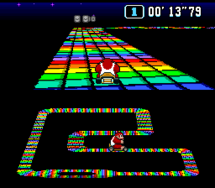
Donkey Kong Jr. racing on Rainbow Road
The track begins with racers taking a turn to the right, where they will find ? Panels to gather items. There are some Jumps, followed by four Thwomps. After this, racers turn to the right again where they can collect some coins, followed by another turn to the right, where there is once again a path with jumping bumps with an incoming turn that might cause racers to fall. After this turn, the track gets narrower and follows a long path where more coins and Thwomps are found along the way with another turn awaiting the player. It is here where the track gets even more narrow increasing the risk of falling. Before the final turn, the track splits into two roads; the left side contains coins while the right side has two ? Panels, both have a pair of Thwomps near the part where these roads merge. Alternatively, there are two jumping bumps in the middle gap; if any racers use a Mushroom while they are heading for them, they can jump over the gap for a significant shortcut. After the final turn, before the finish line, there is another quartet of Thwomps, but this time there is no space between them to pass, with players only being able to pass them by driving on the side or when the Thwomps are rising.
Mario Kart: Super Circuit
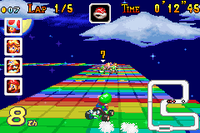
Luigi racing through the track
Rainbow Road reappeared in Mario Kart: Super Circuit, as the last track of the Extra Special Cup. The background is from that game's own Rainbow Road, but with only the sparkles, foreground clouds, and moon appearing; like that track, this one is also translucent. The Thwomps and jumping bumps are removed. The coins' placement is also changed so that all coins are on blue tiles, making it much easier for players to collect them.
Mario Kart 7
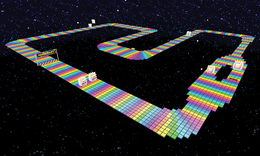
Overview of the track in
Mario Kart 7SNES Rainbow Road is the last course of the Lightning Cup in Mario Kart 7, being the first Rainbow Road to reappear as a classic course in another Mario Kart (besides its reappearance in Mario Kart: Super Circuit).
Even though this track is short, and is one of the shortest tracks in the game, there are only three laps instead of five. The course uses a similar background to that of DS Waluigi Pinball.
Unlike previous incarnations, this new version has the characteristic "glistening" sound effect when drifting on it, a common feature of all Rainbow Roads starting from the GCN rendition.
Unlike in Mario Kart: Super Circuit, the Thwomps (now with their New Super Mario Bros. Wii appearance) return. They are now larger (which reduces their number in the track, from sixteen to seven), and now form ripples on the track upon impact, which the player can trick off of. Also, howling noises can be heard near the Super Thwomps.
The tiles' colors are similar to those of Rainbow Road from Mario Kart: Super Circuit, with fuchsia replacing the red tiles and cyan replacing the turquoise tiles. In first-person view, the player can see through the breaks in the tiles. The widest part of the gap in the forked road is two tiles shorter, but the gap itself is also seven tiles shorter, making the shortcut easier to use. Also, the section of tiles before the fork (from the orange tiles on the narrow part of the straight after turn 7 to the purple tiles before the gap) is wider: the first orange, blue, yellow, and last purple tile rows before the gap are now two tiles wider. The finish line is also two tiles long, removing the red tiles that used to be in front of it.
Ramps replace the yellow bumps, though the first two bumps were removed entirely, the last pair at the fork is now a single taller ramp in front of the gap, and a ramp was added on the inside of the second U-turn, adding a new shortcut (requiring a Mushroom or Mini-Turbo to get across); the ramps are only two tiles wide, rather than three, like the bumps.
Like most other SNES and GBA classic courses, a starting banner stylized after the Mario Kart 64 starting banners is added in this course.
Aside from enhanced percussion, the music sounds the way it does in the SNES version.
Mario Kart 8 / Mario Kart 8 Deluxe
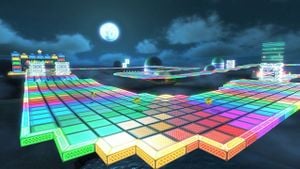
Overview of the track in
Mario Kart 8Rainbow Road returns for the third time in the Legend of Zelda × Mario Kart 8 DLC Pack of Mario Kart 8 and in the base game of Mario Kart 8 Deluxe, appearing as the second course in the Triforce Cup. As a result, for the first time, a Rainbow Road course is not the last track in a cup.
The track's layout is similar to its appearance in Mario Kart 7. The tiles revert to their original colors, though their color pattern is reversed, and they are now flashing LED lights, like on N64 Rainbow Road. There are now eight different colors of tiles, instead of seven from its previous appearances (adding cyan between turquoise and blue), and the tiles the Thwomps land on are now white. The course itself is also larger, wider and banked (namely, the inclined third U-turn). Tiles at the edges of the track now have borders on the outer edges. The forked road is also altered further, with the narrow part of the hole's end filled in, and the ramp in front reverted to the original bumps' height and position. The music is also deeper-pitched and remixed, as with the other classic courses in this game.
The Thwomps work as they do in Mario Kart 7, but they now have sparkles, a mosaic-like appearance, horizontal rainbow lines running from bottom to top of them, and the species' Super Mario Galaxy appearance, like the other Thwomps in Mario Kart 7 and Mario Kart 8, rather than their spiked New Super Mario Bros. Wii design in Mario Kart 7. Additionally, all of the Thwomps are bigger except the last two. Unlike before, when they start to crash down, they will create rainbow waves above them. Also, when they shake before falling, and the moment they land, they make metallic glistening sounds. The waves on the track they create are now bigger, move more quickly, and disappear faster than in Mario Kart 7, making tricks more difficult to perform.

The course as seen at the starting line
The course now takes place in a cloudy night sky with the full moon visible, just like in Super Circuit, but it now has color-changing hills that stick above them. Various Toad Houses litter the landscape below the course, which in itself is similar to SNES Donut Plains 3. The starting banner is now redesigned, with colored blocks with a Star on top of it and the Mario Kart logo's letters now individually colored (red, green, yellow, and blue, also similar to other courses like SNES Donut Plains 3) instead of having a rainbow gradient through the entire logo; the banner also stands on two walled areas, now making the start the only walled part of the course. Also, when a player approaches a turn, two green arrow holograms will appear behind the turn, and indicate in which direction the player must drive (similar to Super Circuit's Nitro courses). Once the player has made the turn, the arrows will disappear.
In the game, this Rainbow Road, N64 Rainbow Road, the new Rainbow Road and GCN Baby Park are the only courses in the game to have the map in different colors instead of just blue.
Staff ghost
The staff ghost for this track is Cat Peach on the Cat Cruiser, with a time of 1:46.599. In Mario Kart 8 Deluxe 200cc, the staff ghost is Tanooki Mario with a time of 1:12.762.
Mario Kart Tour
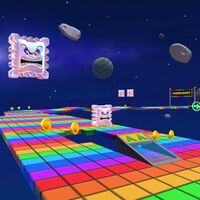
The course in
Mario Kart TourRainbow Road reappears in Mario Kart Tour starting with the Tokyo Tour, mostly taking on the appearance of its Mario Kart 7 iteration, including its starting banner. However, the ramp inside the second U-turn is absent (as in the original and GBA versions), the hole in the road is even smaller than it was before (the narrow part at the end is only one tile long, and the hole in general is 7 tiles shorter), the last two Thwomps are further apart, the red tiling on the course and banner returns (in place of the pink ones in Mario Kart 7), the track edges are rounded, the track itself is thicker, and the arrow signs and Thwomp designs from the Mario Kart 8 rendition return. This course is a favorite of Rosalina, Metal Mario, Ice Mario, Pauline (Party Time), Peach (Wedding), Luigi (Painter), and Tanooki Rosalina. It is also a favorite of Dry Bones (Gold) if he is at level 3 and Peach (Kimono) if she is at level 6. Rainbow Road reuses the arrangement heard in Mario Kart 7, while other classic courses retain their original music. If the beta test is counted, Rainbow Road has appeared in more Coin Rushes than any other course, with three in total.
Beside Rainbow Road itself, the Tokyo Tour also introduced a reversed and a trick variant of the course, referred to as Rainbow Road R and Rainbow Road T respectively; a reversed/trick variant, Rainbow Road R/T, was later added in the 2019 Winter Tour. The R variant now includes a Glide Ramp going over a large gap, with star-shaped sets of coins appearing. The T variant includes a larger quantity of ramps, as well as steeper inclines in certain sections, while also removing all Star Thwomps; the sections that had them originally now constantly wave. The R/T variant greatly changes the layout, adding steeper inclines, sections which constantly wave (though Star Thwomps do appear unlike in the T variant), a Glide Ramp, a large amount of Star Rings, and a Mushroom Trampoline.
SNES Rainbow Road received two remixed versions, titled RMX Rainbow Road 1 and RMX Rainbow Road 2, first appearing in the Super Mario Kart Tour and New Year's 2021 Tour, respectively.
For this course's tour appearances, see List of SNES Rainbow Road tour appearances in Mario Kart Tour.
"I love this tune, so I was really nervous when rearranging, as I didn't want to spoil it. This is the third time this has appeared as a classic course, so I wanted to make it as bright and sparkly as possible. I went all-out and used a cutting edge digital synth sound."
Gallery
Mario Kart: Super Circuit
Minimap as seen in the menu
Minimap as seen in the race
Mario Kart 7
Mario racing on the course
The long jump near the end of the course
Mario Kart 8
MK8 DLC SNES Rainbow Road Course Icon.png
Thwomps, warping the course
Daisy, taking the first shortcut on the course
Daisy, taking the second shortcut on the course
Mario Kart Tour
Course icons
The course icon with Rosalina
The course icon with Shy Guy
The course icon with Metal Mario
The course icon with Ice Mario
The course icon with Lemmy
The course icon of the Reverse variant (old)
The course icon of the Reverse variant (updated)
The course icon of the Reverse variant with Metal Mario
The course icon of the Reverse variant with Rosalina
The course icon of the Reverse variant with Ice Mario
The course icon of the Reverse variant with Peachette
The course icon of the Trick variant
The course icon of the Trick variant with Metal Mario
The course icon of the Trick variant with Bowser
The course icon of the Trick variant with Pink Gold Peach
The course icon of the Reverse/Trick variant
The course icon of the Reverse/Trick variant with Pink Gold Peach
The course icon of the Reverse/Trick variant with Pauline
The course icon of the Reverse/Trick variant with Builder Toad
The course icon of the Reverse/Trick variant with Baby Rosalina
The course icon of the Reverse/Trick variant with King Boo (Gold)
The course icon of the challenge in the Toad Cup (Tokyo Tour) and the Waluigi Cup (Rosalina Tour)
The course icon of the challenge in the Wario Cup (Tokyo Tour), the Waluigi Cup (Exploration Tour), and the Ice Mario Cup (Peach vs. Daisy Tour)
The course icon of the challenge in the Dry Bones Cup (2019 Halloween Tour) and the Wendy Cup (Peach Tour)
The course icon of the challenge in the Koopa Troopa Cup (London Tour) and the Baby Rosalina Cup (Sunset Tour)
The course icon of the challenge in the Bowser Cup (Valentine's Tour)
The course icon of the challenge in the Rosalina Cup (Vancouver Tour) and the Larry Cup (Ninja Tour)
The course icon of the challenge in the Diddy Kong Cup (Vancouver Tour) and the Ludwig Cup (2021 Los Angeles Tour)
The course icon of the challenge in the Rosalina Cup (Mario Bros. Tour)
The course icon of the challenge in the Baby Mario Cup (Mario Bros. Tour) and the Lemmy Cup (Kamek Tour)
The course icon of the challenge in the King Boo Cup (2020 Halloween Tour) and the Mario Cup (2021 Halloween Tour)
The course icon of the challenge in the Waluigi Cup (2020 Halloween Tour)
Screenshots
Names in other languages
| Language
|
Name
|
Meaning
|
| Japanese |
レインボーロード
Reinbō Rōdo
|
Rainbow Road
|
| Chinese |
彩虹之路
Cǎihóng zhī Lù
|
Rainbow Road
|
| Chinese (simplified) |
彩虹桥 (Mario Kart 7 / Mario Kart: Super Circuit prototype)
Cǎihóng Qiáo
|
Rainbow Bridge
|
| Dutch |
Regenboogbaan
|
Rainbow Track
|
| German |
Regenbogen-Boulevard
|
Rainbow Boulevard
|
| Italian |
Pista Arcobaleno
|
Rainbow Track
|
| Korean |
무지개 로드
Mujigae Rodeu
|
Raindow Road
|
| Portuguese (NOA) |
Avenida Arco-íris
|
Rainbow Avenue
|
| Portuguese (NOE) |
Estrada Arco-Íris
|
Rainbow Road
|
| Russian |
Трасса Радуга
Trassa Raduga
|
Rainbow Track
|
| Spanish |
Senda Arco Iris
|
Rainbow Trail
|
Trivia
- SNES Rainbow Road is the only course in Mario Kart 7 not to have a Dash Panel/ramp, and one of four courses not to have a Glide Ramp; the others are N64 Luigi Raceway, GCN Daisy Cruiser, and Rosalina's Ice World.
- Also, in Mario Kart 8, it is one of the two only courses that do not have any Dash Panels, Glide Ramps, underwater sections, or anti-gravity sections, with the other being GCN Yoshi Circuit, another course from DLC Pack 1.
- The track's location has alternated between each of its appearances. In Super Mario Kart, Mario Kart 7, and Mario Kart Tour, it is in space, but in Mario Kart: Super Circuit and Mario Kart 8, it is in the night sky.
References
Template:Racecourses
| Mario Kart Tour
|
| Drivers
|
| Normal
|
Baby Mario • Baby Peach • Baby Daisy • Baby Rosalina • Baby Luigi • Koopa Troopa • Shy Guy • Dry Bones • Iggy • Larry • Lemmy • Ludwig • Morton • Roy • Wendy
|
| Super
|
Mario • Peach • Yoshi • Daisy • Toad • Toadette • Rosalina • Luigi • Toad (Pit Crew) • Red Yoshi • Blue Yoshi • Pink Yoshi • Yellow Toad (Pit Crew) • Light-blue Toad (Pit Crew) • Red Toad (Pit Crew) • Orange Yoshi • Green Toad (Pit Crew) • Pink Toad (Pit Crew) • Light-blue Yoshi • Yellow Yoshi • Purple Toad (Pit Crew) • Bowser • Donkey Kong • Diddy Kong • Lakitu • Bowser Jr. • Wario • Waluigi • King Boo • Black Shy Guy • Red Koopa (Freerunning) • Birdo • Pink Shy Guy • Birdo (Light Blue) • Hammer Bro • Boomerang Bro • Ice Bro • Fire Bro • Birdo (Yellow) • Monty Mole • Green Shy Guy • Blue Koopa (Freerunning) • Birdo (Blue) • Purple Koopa (Freerunning) • Light-blue Shy Guy • Blue Shy Guy • Birdo (Orange) • White Shy Guy • Koopa (Freerunning) • Orange Shy Guy • Birdo (Red) • Yellow Shy Guy • Birdo (Green)
|
| High-End
|
Metal Mario • Peachette • Pauline • Mario (Musician) • Peach (Kimono) • Mario (Hakama) • Rosalina (Halloween) • Peach (Vacation) • Mario (Santa) • Pink Gold Peach • Daisy (Holiday Cheer) • Yoshi (Reindeer) • Pauline (Party Time) • Mario (Happi) • Toad (Party Time) • Peach (Wintertime) • Penguin Luigi • Ice Mario • Baby Peach (Cherub) • Rosalina (Aurora) • Mario (Classic) • Luigi (Classic) • Baby Rosalina (Detective) • Yoshi (Egg Hunt) • Black Yoshi • Builder Mario • Builder Toad • Daisy (Fairy) • Mario (Chef) • Peach (Wedding) • Rosalina (Swimwear) • Mario (Swimwear) • Captain Toad • Toadette (Explorer) • Daisy (Yukata) • Mario (SNES) • Mario (Sunshine) • Mario (Halloween) • Peach (Halloween) • Peach (Explorer) • Builder Luigi • Fire Rosalina • Luigi (Lederhosen) • Cat Peach • Cat Toad • Pauline (Rose) • Penguin Toad • Mario (Racing) • White Yoshi • Baby Mario (Koala) • Builder Toadette • Mario (Tuxedo) • Luigi (Painter) • Daisy (Swimwear) • Mario (Baseball) • Peach (Happi) • Penguin Mario • Yoshi (Kangaroo) • Tanooki Mario • Tanooki Rosalina • Mario (Satellaview) • Penguin Toadette • Cat Rosalina • Luigi (Vacation) • Mario (Golf) • Luigi (Golf) • Mario (Aviator) • Mario (Samurai) • Peach (Yukata) • Yoshi (Gold Egg) • Rosalina (Volendam) • Daisy (Farmer) • Dr. Mario • Dr. Luigi • Dr. Peach • Cat Mario • Cat Luigi • Rosalina (Chef) • Daisy (Thai Dress) • Daisy (Sailor) • Toadette (Sailor) • White Tanooki Mario • Luigi (Knight) • Mario (King) • Luigi (Chef) • Kitsune Luigi • Toad (Astronaut) • Toadette (Astronaut) • Poochy • Toad (Tourist) • Luigi (Gold Knight) • Pauline (Cowgirl) • Mario (Black Suit) • Gold Mario • Dry Bowser • King Boo (Luigi's Mansion) • Shy Guy (Pastry Chef) • Waluigi (Bus Driver) • Gold Koopa (Freerunning) • Wario (Hiker) • Dry Bones (Gold) • Funky Kong • Dixie Kong • Dry Bowser (Gold) • Wario (Cowboy) • Nabbit • Bowser Jr. (Pirate) • King Bob-omb • Donkey Kong Jr. (SNES) • Shy Guy (Gold) • King Boo (Gold) • Bowser (Santa) • Lakitu (Party Time) • Birdo (Black) • Shy Guy (Ninja) • King Bob-omb (Gold) • Kamek • Waluigi (Vampire) • Meowser • Chargin' Chuck • Pink Shy Guy (Ninja) • Birdo (White) • Dr. Bowser • Petey Piranha • Chargin' Chuck (Gold) • Petey Piranha (Gold) • Larry (Wintertime) • Light-blue Shy Guy (Explorer) • Yellow Shy Guy (Explorer) • Donkey Kong (Gladiator) • Wiggler • Wiggler (Gold) • Mii Racing Suits
|
| Vehicle parts
|
| Karts |
Normal
|
Pipe Frame • Birthday Girl • Mushmellow • Koopa Dasher • Biddybuggy • Blue Biddybuggy • Cheep Charger • Pink Mushmellow • Birthday Girl Rosalina • Green Kiddie Kart • Red Kiddie Kart • Bullet Blaster • Bull's-Eye Banzai • Landship • Pipe Buggy • Warship • Green Cheep Charger
|
| Super
|
Mach 8 • Daytripper • Turbo Yoshi • Soda Jet • Super Blooper • Gold Blooper • Royale • Cloud 9 • Poltergust 4000 • Streamliner • White Royale • Zucchini • Red Streamliner • Red Turbo Yoshi • Blue Seven • Super 1 • Dasher II • Tea Coupe • Yellow Turbo Birdo • Egg 1 • Birthday Girl Daisy • Red Standard 8 • Green Standard 8 • Cucumber • Blue Royale • Blue Turbo Yoshi • Orange Turbo Yoshi • Pink Turbo Yoshi • Light-blue Turbo Yoshi • Yellow Turbo Yoshi • Flame Flyer • Barrel Train • DK Jumbo • Chrome DK Jumbo • Koopa Clown • Dark Clown • Para-Wing • Turbo Birdo • Light-blue Turbo Birdo • Bolt Buggy • Rambi Rider • Blue Turbo Birdo • Orange Turbo Birdo • Red Turbo Birdo • Green Turbo Birdo
|
| High-End
|
B Dasher • Black B Dasher • Yellow Taxi • Quickshaw • Kabuki Dasher • Circuit Special • Black Circuit • Bumble V • Queen Bee • Trickster • Ghost Ride • Macharon • Carrot Kart • Cheermellow • Wild Wing • Radish Rider • Wildfire Flyer • Ribbon Rider • Double-Decker • Swift Jack • Red B Dasher • Jingle Bells • Platinum Taxi • Glam Bruiser • Gilded Prancer • Ice-blue Poltergust • P-Wing • Apple Kart • Comet Tail • Bright Bunny • Dozer Dasher • Clanky Kart • Wild Black • Karp Kart • Prancer • Rose Queen • Green Apple Kart • Choco Macharon • Gold Egg • Sweet Daytripper • Red Taxi • Pink Wing • Happy Ride • Blue Soda • Clackety Kart • Gold Clanky Kart • Festival Girl • Black Kabuki Dasher • 8-Bit Pipe Frame • Gold Pipe Frame • Surf Sailer • Star-Spangled Flyer • Green Circuit • Sports Coupe • Pumpkin Kart • Dark Trickster • Sunset Cloud • Steel Driver • Holiday King • Gold Snow Skimmer • Dreamy Egg • Fast Frank • Iron Cucumber • Cat Cruiser • Wild Pink • Rose Taxi • B Dasher Mk. 2 • Decal Streamliner • Orange Streamliner • White Turbo Yoshi • Sakura Quickshaw • Jet Cruiser • Inferno Flyer • Rambi Runner • Pink Dozer • Grand Badwagon • Paintster • Lime Tea Coupe • Sunny Surf Sailer • Pinch Hitter • Cleanup Hitter • Ice Dozer • Green Double-Decker • Black Cat Cruiser • Red B Dasher Mk. 2 • Pink B Dasher Mk. 2 • Classic B Dasher Mk. 2 • Sky-Blue B Dasher Mk. 2 • Metal B Dasher Mk. 2 • Cream B Dasher Mk. 2 • Green B Dasher Mk. 2 • Tanooki Kart • Gold Pumpkin Kart • Lunar Cruiser • Sleigh Rider • White Snow Skimmer • Frosty Bells • Frost Wing • Gray Cat Cruiser • Sports Coupe 2022 • Roaring Racer • Jukebox Buggy • Sneeker • Green Lightning • Cupid's Arrow • Wild Slugger • Prop Kart • Magma Broom • Star Broom • Yellow 8-Bit Pipe Frame • Warrior Wagon • Armored Rider • Black Turbo Yoshi • Gold Bunny • Flower Kart • Dragonfly • Firefly • Daikon Rocket • Capsule Kart • Blue-Green Capsule Kart • White Bruiser • Coconut 1 • Pink Capsule Kart • Cream Cat Cruiser • Green Cat Cruiser • Goo-Goo Buggy • Goo-Goo Pink • Gold Kiddie Kart • Sweet Ride • White Fast Frank • Tuk-Tuk Kart • Tropical Truck • Gold Zucchini • Lightning Streamliner • Flowery Badwagon • Coral Jet Cruiser • Watermelon Kart • Ice-Cream Minibus • Chocolate Banana Minibus • Strawberry Soft Swerve • Shielded Speedster • Gold Standard • Gold Double-Decker • Black Carriage • Green Speeder • Flaming Speeder • Gold Sweet Ride • Streetle • Blue Speeder • Swift Talon • Gold Eagle • Blazing Eagle • Camo Tanooki Kart • Gold Rambi Rider • Moo Moo Offroader • Pink Speeder • Pink Sneeker • Gold Jingle Bell • Holiday Speeder • Wild Gold • Rainbow Taxi • Blooper Shuttle • Gold Lunar Cruiser • Gold Quickshaw • Pineapple 1 • Hot Pot Hot Rod • Rainbow Streetle • Gold Capsule Kart • Gold 8-Bit Pipe Frame • Taiko Drum Dasher • Sakura Sports Coupe • Bright Girl • Huffin Puffin Egg • Jumbo Jetter • Gold Paintster • Silver Flower Kart • Bronze Cucumber • Cream Classic • Red Comet • Pink Comet • Green Comet • Gold Comet • Mach 8-R • Gold Cupid's Arrow • Silver Cupid's Arrow • Silver Warrior Wagon • Gold Warrior Wagon • Black Shielded Speedster • Gold Shielded Speedster • Yeehaw Wagon • Desert Rose Wagon • Yellow Sub Scooter • Blue Sub Scooter • Gold Driver • Dolphin Drifter • Purple Rattle Buggy • Goo-Goo Gold • Gold Wild Slugger • Spicy Zucchini • Chocolate Mint Soft Swerve • Gold Soft Swerve • Monarch Kart • Gold Monarch Kart • Black B Dasher Mk. 2 • Gold B Dasher • Badwagon • Blue Badwagon • Gold Train • Bruiser • Snow Skimmer • Offroader • Banana Master • Poison Apple Kart • Cheep Snorkel • Gold Cheep Snorkel • Gold Cheep Charger • Dark Buggy • Koopa King • Brown Offroader • Cact-X • Pirate Sushi Racer • Silver Bullet Blaster • Head Honcho • DK Maximum • Sushi Racer • Gilded King • Crawly Kart • Black Dozer • Party-Wing • Penguin Slider • Black Penguin Slider • Cact-Ice • Black Turbo Birdo • Purple Bunny • Jade Hop Rod • Crimson Hop Rod • Dark Hop Rod • Kamek's Zoom Broom • Silver King • Vampire Flyer • Red Crawly Kart • Yellow Offroader • Cact-R • Cheership • Candy Clown • Tiger Bruiser • Combo Cruiser • Sakura Hop Rod • White Turbo Birdo • Green-Yellow Capsule Kart • Piranha Pipes • Red Offroader • Goo-Goo Black • Cact-B • Gold Bullet Blaster • Red Vampire Flyer • Gold Trickster • Gold Bruiser • Black Sneeker • Purple Dozer • Blue Crawly Kart • Rainbow Pipe Buggy • Gold Hop Rod • Black Jingle Bell • Gold Sushi Racer • Dry Bones Dasher • Waluigi Racer Mk. 2 • Chain Chomp Chariot • Fish Bone Ferry • Gold Fish Bone Ferry • Wiggler Egg • Boo Pipes • Gold Pipes • Wild Wiggler
|
| Gliders |
Normal
|
Super Glider • Parachute • Parafoil • Paper Glider • Droplet Glider • BBIA Parafoil • Minion Paper Glider • Piston Glider • Piranha Plant Parafoil
|
| Super
|
Peach Parasol • Flower Glider • Oilpaper Umbrella • Lightning Oilpaper • Pink Flower Glider • 8-Bit Jumping Mario • ? Block • Plaid Ribbon • Eggshell Glider • 8-Bit Jumping Luigi • Mushroom Glider • Bob-omb Parafoil • Shell Parachute • Wario Wing • Waluigi Wing • BaNaNa Parafoil • Blue Flower Glider
|
| High-End
|
Gold Glider • Fare Flier • Purple Oilpaper Umbrella • Full Flight • Strawberry Crêpe • Le Tricolore • Starchute • Royal Parachute • Glitter Glider • Soaring Jack • Gift Glider • New Year's 2020 • New Year's Kite • Fireworks Parachute • Crimson Crane • Blizzard Parasol • Blizzard Balloons • Sweetheart Glider • Heart Balloons • Luma Parafoil • Rainbow Starchute • Bright Glider • Safety Glider • Daisy Glider • Pink Gold Paper Glider • Butterfly Sunset • Chocolate Donut • Gold Crane • Chocolate Banana Crêpe • Strawberry Donut • Silver Bells • Silver-and-Gold Hearts • Manta Glider • Treasure Map • Butterfly Wings • Great Sail • Festival Wings • 8-Bit Star • Super Mario Kart Glider • Star-Spangled Glider • Spider Glider • Sunset Balloons • Silver Starchute • Jolly Bells • Butterfly Prism • Planet Glider • New Year's 2021 • Gold New Year's Kite • Toe-Bean Balloons • Calico Parafoil • Black Great Sail • Silver Manta Glider • Rose Parasol • Snow Crystals • 8-Bit Fire Flower • Surf Master • Starry Great Sail • Black Toe-Bean Balloons • 8-Bit Bullet Bill • Glinting Glider • Flying Easel • Sunny Surf Master • Polka-Dot Manta Glider • Home-Field Glider • Gold Home-Field Glider • Springtime Crane • Yukata Ribbon • Silver Surf Master • Ship's Wheel • Tanooki Parafoil • Gold Tanooki Parafoil • Magic Parasol • 8-Bit Super Mushroom • Meteor Balloons • Pink Gold Meteors • Galaxy Glider • Candlelight Flight • Gold Penguin Wingtip • Aurora Balloons • New Year's 2022 • Black Cat Parafoil • Cat Parafoil • Gold Toe-Bean Balloons • Glittering Parasol • Luigi Parafoil • Sky-High Flyer • Record Setter • Mario's Mustache • Luigi's Mustache • Origami Glider • Sakura Origami Glider • Gold Eggshell Glider • Green Sprout • Magniflying Glass • Flybrary Book • Pink Magniflying Glass • Cream Toe-Bean Balloons • Green Cat Parafoil • Candlelight Flight Cake • Pretzel Glider • Tulip Corsage • Red and Gold Umbrella • 8-Bit 1-Up Mushroom • Tropical Balloons • Fire Manta Glider • Mint & Berry Balloons • Vanilla & Chocolate Balloons • Icy Mario's Mustache • Flying Flappers • Silver Luigi's Mustache • Mario's Hat Balloon • Luigi's Hat Balloon • Gold Cloud Balloons • White Waves Origami Glider • Chocolate Pretzel • Para-Panini • Silver Candlelight Flight • Autumn Leaves • Calico Toe-Bean Balloons • Wonderful Garnet • Festive Holly • Yellow Hard Hat Balloon • Fuzzy Kite • Gold Hard Hat Balloon • New Year's 2023 • Gold Meteors • Rainbow Fare Flier • Stealth Glider • Gold Umbrella • Wonderful Diamond • Gold Candlelight Flight • 8-Bit Super Glider • Gold 8-Bit Glider • 8-Bit Block Glider • 8-Bit Goomba • Bright Ribbon • Yoshi's Cookies • Smiley Flower Glider • Golden Glider • Gold Tulips • Gold Manta Glider • Red Checkered Glider • Pink Checkered Glider • Green Checkered Glider • Gold Checkered Glider • Gold Origami Glider • Gold Bells • Glittering Glider • Red Emblem • Green Emblem • Mario Bros. Parafoil • Mosaic Starchute • Jellychute • Wavy Great Sail • Dolphin Great Sail • Pink Bubble Balloon • Mario Golf Cap • Luigi Golf Cap • Gold Mario Golf Cap • Melon & Banana Balloons • Spooky Sprinkle Balloons • Gold Chocolate Balloons • Royal Flush • Rainbow Bells • Gold Mario's Hat Balloon • Swooper • Bullet Bill Parachute • Cloud Glider • Rainy Balloons • Wicked Wings • Gold Swooper • Banana Wingtip • Tropical Glider • Dragon Wings • Blooper Wingtip • Nabbit Oilpaper Umbrella • Cheep Cheep Masks • Dry Bowser Umbrella • Penguin Wingtip • Bright Balloons • Ninja Scroll • Dream Glider • Vampire Wings • Golden Wings • Wario's Mustache • Waluigi's Mustache • Wonderful Wings • Wicked Topaz • Piranha Plant Balloons • Secret Scroll • Lava Rocks • Black Starchute • Boo Masks • Nabbit Parachute • Gold Boo Masks • Roy Oilpaper • Rainbow Flappy Wings • Gold Flappy Wings • Wiggler Parachute • Gold Piranha Plant Balloons • Baby Mario Hanafuda • Yoshi's Egg Hanafuda • Peach Hanafuda • Barrel Hanafuda • Blooper Hanafuda • Cape Mario Hanafuda • Bullet Bill Hanafuda • Boo Hanafuda • Piranha Plant Hanafuda • Goomba Hanafuda • Jumping Mario Hanafuda • Bowser Hanafuda
|
| Tires
|
Blue Standard • Cyber Slick • Gold Tires • Metal • Monster • Mushroom • Off-Road • Red Monster • Retro Off-Road • Roller • Slick • Slim • Sponge • Standard • Wood
|
| Courses
|
| New courses |
City courses
|
New York Minute (R, T, R/T, 2, 2R, 2T, 2R/T, 3, 3R, 3T, 3R/T, 4, 4R, 4T, 4R/T) (tour appearances) • Tokyo Blur (R, T, R/T, 2, 2R, 2T, 2R/T, 3, 3R, 3T, 3R/T, 4, 4R, 4T, 4R/T) (tour appearances) • Paris Promenade (R, T, R/T, 2, 2R, 2T, 2R/T, 3, 3R, 3T, 3R/T) (tour appearances) • London Loop (R, T, R/T, 2, 2R, 2T, 2R/T, 3, 3R, 3T, 3R/T) (tour appearances) • Vancouver Velocity (R, T, R/T, 2, 2R, 2T, 2R/T, 3, 3R, 3T, 3R/T) (tour appearances) • Los Angeles Laps (R, T, R/T, 2, 2R, 2T, 2R/T, 3, 3R, 3T, 3R/T) (tour appearances) • Berlin Byways (R, T, R/T, 2, 2R, 2T, 2R/T, 3, 3R, 3T, 3R/T) (tour appearances) • Sydney Sprint (R, T, R/T, 2, 2R, 2T, 2R/T, 3, 3R, 3T, 3R/T) (tour appearances) • Singapore Speedway (R, T, R/T, 2, 2R, 2T, 2R/T, 3, 3R, 3T, 3R/T) (tour appearances) • Amsterdam Drift (R, T, R/T, 2, 2R, 2T, 2R/T, 3, 3R, 3T, 3R/T) (tour appearances) • Bangkok Rush (R, T, R/T, 2, 2R, 2T, 2R/T, 3, 3R, 3T, 3R/T) (tour appearances) • Athens Dash (R, T, R/T, 2, 2R, 2T, 2R/T, 3, 3R, 3T, 3R/T) (tour appearances) • Rome Avanti (R, T, R/T, 2, 2R, 2T, 2R/T, 3, 3R, 3T, 3R/T) (tour appearances) • Madrid Drive (R, T, R/T, 2, 2R, 2T, 2R/T, 3, 3R, 3T, 3R/T) (tour appearances)
|
| Other
|
Merry Mountain (R, T, R/T) (tour appearances) • Ninja Hideaway (R, T, R/T) (tour appearances) • Sky-High Sundae (R, T, R/T) (tour appearances) • Piranha Plant Cove (R, T, R/T, 2, 2R, 2T, 2R/T, 3, 3R, 3T, 3R/T) (tour appearances) • Yoshi's Island (R, T, R/T) (tour appearances) • Piranha Plant Pipeline (R, T, R/T) (tour appearances) • Squeaky Clean Sprint (R, T, R/T) (tour appearances)
|
| Remix courses
|
RMX Mario Circuit 1 (R, T, R/T) (tour appearances) • RMX Choco Island 1 (R, T, R/T) (tour appearances) • RMX Rainbow Road 1 (R, T, R/T) (tour appearances) • RMX Rainbow Road 2 (R, T, R/T) (tour appearances) • RMX Choco Island 2 (R, T, R/T) (tour appearances) • RMX Vanilla Lake 1 (R, T, R/T) (tour appearances) • RMX Ghost Valley 1 (R, T, R/T) (tour appearances) • RMX Bowser's Castle 1 (R, T, R/T) (tour appearances) • RMX Donut Plains 1 (R, T, R/T) (tour appearances) • RMX Vanilla Lake 2 (R, T, R/T) (tour appearances)
|
| Classic courses |
SNES courses
|
Mario Circuit 1 (R, T, R/T) (tour appearances) • Donut Plains 1 (R, T, R/T) (tour appearances) • Ghost Valley 1 (R, T, R/T) (tour appearances) • Mario Circuit 2 (R, T, R/T) (tour appearances) • Choco Island 1 (R, T, R/T) (tour appearances) • Ghost Valley 2 (R, T, R/T) (tour appearances) • Donut Plains 2 (R, T, R/T) (tour appearances) • Mario Circuit 3 (R, T, R/T) (tour appearances) • Choco Island 2 (R, T, R/T) (tour appearances) • Vanilla Lake 1 (R, T, R/T) (tour appearances) • Bowser Castle 3 (R, T, R/T) (tour appearances) • Donut Plains 3 (R, T, R/T) (tour appearances) • Koopa Troopa Beach 2 (R, T, R/T) (tour appearances) • Vanilla Lake 2 (R, T, R/T) • (tour appearances) • Rainbow Road (R, T, R/T) (tour appearances)
|
| N64 courses
|
Luigi Raceway (R, T, R/T) (tour appearances) • Koopa Troopa Beach (R, T, R/T) (tour appearances) • Kalimari Desert (R, T, R/T, 2, 2R, 2T, 2R/T) (tour appearances) • Frappe Snowland (R, T, R/T) (tour appearances) • Choco Mountain (R, T, R/T) (tour appearances) • Mario Raceway (R, T, R/T) (tour appearances) • Royal Raceway (R, T, R/T) (tour appearances) • Yoshi Valley (R, T, R/T) (tour appearances)
|
| GBA courses
|
Peach Circuit (R, T, R/T) (tour appearances) • Riverside Park (R, T, R/T) (tour appearances) • Bowser's Castle 1 (R, T, R/T) (tour appearances) • Boo Lake (R, T, R/T) (tour appearances) • Bowser's Castle 2 (R, T, R/T) (tour appearances) • Luigi Circuit (R, T, R/T) (tour appearances) • Sky Garden (R, T, R/T) (tour appearances) • Cheep-Cheep Island (R, T, R/T) (tour appearances) • Sunset Wilds (R, T, R/T) (tour appearances) • Snow Land (R, T, R/T) (tour appearances) • Yoshi Desert (R, T, R/T) (tour appearances) • Bowser's Castle 3 (R, T, R/T) (tour appearances) • Lakeside Park (R, T, R/T) (tour appearances) • Bowser's Castle 4 (R) (tour appearances)
|
| GCN courses
|
Baby Park (R, T, R/T) (tour appearances) • Mushroom Bridge (R, T, R/T) (tour appearances) • Daisy Cruiser (R, T, R/T) (tour appearances) • Waluigi Stadium (R, T, R/T) (tour appearances) • Yoshi Circuit (R, T, R/T) (tour appearances) • DK Mountain (R, T, R/T) (tour appearances) • Dino Dino Jungle (R, T, R/T) (tour appearances)
|
| DS courses
|
Luigi's Mansion (R, T, R/T) (tour appearances) • Waluigi Pinball (R, T, R/T) (tour appearances) • Shroom Ridge (R, T, R/T) (tour appearances) • DK Pass (R, T, R/T) (tour appearances) • Mario Circuit (R, T, R/T) (tour appearances) • Airship Fortress (R, T, R/T) (tour appearances) • Peach Gardens (R, T, R/T) (tour appearances)
|
| Wii courses
|
Mushroom Gorge (R, T, R/T) (tour appearances) • Coconut Mall (R, T, R/T) (tour appearances) • DK Summit (R, T, R/T) (tour appearances) • Daisy Circuit (R, T, R/T) (tour appearances) • Koopa Cape (R, T, R/T) (tour appearances) • Maple Treeway (R, T, R/T) (tour appearances) • Dry Dry Ruins (R, T, R/T) (tour appearances) • Moonview Highway (R, T, R/T) (tour appearances) • Rainbow Road (R, T, R/T) (tour appearances)
|
| 3DS courses
|
Toad Circuit (R, T, R/T) (tour appearances) • Daisy Hills (R, T, R/T) (tour appearances) • Cheep Cheep Lagoon (R, T, R/T) (tour appearances) • Shy Guy Bazaar (R, T, R/T) (tour appearances) • Mario Circuit (R, T, R/T) (tour appearances) • Rock Rock Mountain (R, T) (tour appearances) • Piranha Plant Slide (R, T, R/T) (tour appearances) • Wario Shipyard (R, T, R/T) (tour appearances) • Neo Bowser City (R, T, R/T) (tour appearances) • Rosalina's Ice World (R, T, R/T) (tour appearances) • Bowser's Castle (R, T, R/T) (tour appearances) • Rainbow Road (R, T, R/T) (tour appearances)
|
| Battle courses |
New courses
|
New York Minute B (tour appearances) • Paris Promenade B (tour appearances)
|
| Classic courses
|
GBA Battle Course 1 (tour appearances) • GCN Cookie Land (tour appearances) • DS Twilight House (tour appearances)
|
| Other
|
| Bonus challenges
|
Ready, Set, Rocket Start • Ring Race • Do Jump Boosts • Big Reverse Race • Goomba Takedown • Glider Challenge • Steer Clear of Obstacles • Vs. Mega • Smash Small Dry Bones • Break Item Boxes • Time Trial • Combo Attack • Take them out quick! • Snap a Photo • Precision Gliding • Big Reverse Race vs. 100
|
| Cups
|
Baby Daisy Cup • Baby Luigi Cup • Baby Mario Cup • Baby Peach Cup • Baby Rosalina Cup • Birdo Cup • Boomerang Bro Cup • Bowser Cup • Bowser Jr. Cup • Cat Peach Cup • Chargin' Chuck Cup • Daisy Cup • Diddy Kong Cup • Dixie Kong Cup • Donkey Kong Cup • Dry Bones Cup • Dry Bowser Cup • Fire Bro Cup • Fire Rosalina Cup • Funky Kong Cup • Gold Mario Cup • Hammer Bro Cup • Ice Bro Cup • Ice Mario Cup • Iggy Cup • Kamek Cup • King Bob-omb Cup • King Boo Cup • Koopa Troopa Cup • Lakitu Cup • Larry Cup • Lemmy Cup • Ludwig Cup • Luigi Cup • Mario Cup • Metal Mario Cup • Mii Cup • Monty Mole Cup • Morton Cup • Nabbit Cup • Pauline Cup • Peach Cup • Peachette Cup • Pink Gold Peach Cup • Poochy Cup • Rosalina Cup • Roy Cup • Shy Guy Cup • Tanooki Mario Cup • Toad Cup • Toadette Cup • Waluigi Cup • Wario Cup • Wendy Cup • Yoshi Cup
|
| Tours |
2019
|
New York Tour • Tokyo Tour • Halloween Tour • Paris Tour • Winter Tour • London Tour • Holiday Tour
|
| 2020
|
New Year's Tour • Ice Tour • Valentine's Tour • Vancouver Tour • Mario Bros. Tour • Baby Rosalina Tour • Hammer Bro Tour • Yoshi Tour • Trick Tour • Flower Tour • Jungle Tour • Cooking Tour • Peach Tour • Marine Tour • Exploration Tour • Wild West Tour • Pirate Tour • Summer Festival Tour • Super Mario Kart Tour • Los Angeles Tour • 1st Anniversary Tour • Halloween Tour • Sunset Tour • Mario vs. Luigi Tour • Winter Tour • Rosalina Tour • New Year's 2021 Tour
|
| 2021
|
Berlin Tour • Cat Tour • Peach vs. Daisy Tour • Snow Tour • Mario Tour • Yoshi Tour • Ninja Tour • Sydney Tour (April–May) • Bowser vs. DK Tour • Trick Tour • Wedding Tour • Paris Tour • Summer Tour • Los Angeles Tour • Mario vs. Peach Tour • Frost Tour • Kamek Tour • Sydney Tour (September) • 2nd Anniversary Tour • Autumn Tour • Halloween Tour • Toad vs. Toadette Tour • Space Tour • Holiday Tour • Penguin Tour • New Year's 2022 Tour
|
| 2022
|
Singapore Tour • Wario vs. Waluigi Tour • Los Angeles Tour • Sky Tour • Mii Tour • Samurai Tour • Yoshi Tour • Amsterdam Tour • Doctor Tour • Peach vs. Bowser Tour (May) • Cat Tour • Metropolitan Tour • Bangkok Tour • Piranha Plant Tour • Ocean Tour • Sundae Tour • Bowser Tour • Mario vs. Luigi Tour • Anniversary Tour • Battle Tour • Halloween Tour • Autumn Tour • Animal Tour • Peach vs. Bowser Tour (November–December) • Holiday Tour • New Year's Tour
|
| 2023
|
Space Tour • Winter Tour • Exploration Tour • Doctor Tour • Mario Tour • Ninja Tour • Yoshi Tour • Spring Tour • Bowser Tour • Mii Tour • Princess Tour • Mario vs. Luigi Tour • Night Tour • Pipe Tour • Sunshine Tour • Vacation Tour • Summer Tour • Sundae Tour • Anniversary Tour
|
| Items |
Regular items
|
Banana • Green Shell • Red Shell • Spiny Shell • Bob-omb • Mushroom • Mega Mushroom • Bullet Bill • Blooper • Lightning • Super Horn • Coin • Star • Feathera
|
| Special items
|
Triple Bananas • Giant Banana • Triple Green Shells • Bowser's Shell • Double Bob-ombs • Triple Mushrooms • Fire Flower • Boomerang Flower • Ice Flower • Heart • Yoshi's Egg • Birdo's Egg • Bubble • Banana Barrels • Mushroom Cannon • Bob-omb Cannon • Lucky Seven • Dash Ring • Coin Box • Hammer • Giga Bob-omb • Super Bell • Super Leaf • Capsule
|
| Inventory items
|
Coin • Coin Rush ticket • Event tokena • Grand Star • Item ticket • Level-boost ticket • Point-boost ticket • Points-cap ticketa • Ruby • Star ticket • Team tokena • Quick ticket
|
| Course elements |
Interactable
|
Banzai Bill • Barrel • Barrel Bomb • Bath Bomb • Barrel Cannon • Big egg • Blimp • Bob-omb Car • Bone Piranha Plant • Boulder • Burner • Bus • Cannon • Car • Ceiling Needle • Chain Chomp • Cheep Cheep • Clampy • Crate • Dash Panel • Dash panel ramp truck • Exploring Shy Guy • Falling Pillar • Festive tree • Fire Piranha Plant • Flipper • Floaty • Flying Shy Guy • Fuzzy • Glide Ramp • Goal Ring • Goat • Goomba • Goomba Tower • Half-pipe • Hot-air balloon • Inky Piranha Plant • Jack-o'-lantern • Jar • Jellybeam • Jump Boost field • Kadomatsu • Kanaami Road • Lava Bubble • Lava Geyser • Leaf pile • Maw-Ray • Mecha Cheep • Metal ball • Mud • Mushroom Platform • Mushroom Trampoline • Noshi • Oil slick • Penguin • Pipe • Piranha Plant • Pokey • Puddle • Ramp • Rocky Wrench • Rolling rock • Shoe • Sidestepper • Skating Shy Guy • Snow block • Snowball • Snowboarding Shy Guy • Snowperson • Soccer Ball • Spider Web • Spring egg • Star Ring • Star Thwomp • Stilt Guy • Swoop • Table • Thwomp • Traffic cone • Train • Truck • Walking Tree • Water Geyser • Wiggler • Wiggler Wagon • Whomp • Winged Cloud • Wooden cutout
|
| Non-interactable
|
Big Cheep Cheep • Boo • Boo Buddies • Bulber • Goonie • Huffin Puffin • Incoming Chomp • Nep-Enut • Note Block • Painting • Petal Guy • Shy Guy Tent • Star Bit • Vase
|
| Techniques
|
Drift • Hop • Jump Boost • Mini-Turbo • Rocket Start • Slipstream
|
| Favored and favorite courses
|
New (Amsterdam Drift · Athens Dash · Bangkok Rush · Berlin Byways · London Loop · Los Angeles Laps · New York Minute · Paris Promenade · Piranha Plant Cove · Rome Avanti · Singapore Speedway · Sydney Sprint · Tokyo Blur · Vancouver Velocity) • Remix • Super Mario Kart (SNES) • Mario Kart 64 (N64) • Mario Kart: Super Circuit (GBA) • Mario Kart: Double Dash!! (GCN) • Mario Kart DS (DS) • Mario Kart Wii (Wii) • Mario Kart 7 (3DS) • Battle
|
| Notable areas, landmarks, and sightings |
City courses
|
Amsterdam • Athens (Hadrian's Arch · Parthenon) • Bangkok • Berlin (Berlin Wall · Brandenburg Gate · Charlottenburg Palace) • London (Big Ben · Tower Bridge · Tower of London) • Madrid (Prado Museum · Ventas Bullring) • New York (Empire State Building · Statue of Liberty · Rockefeller Center) • Paris (Arc de Triomphe · Cathedral of Notre Dame · Eiffel Tower · Louvre) • Rome (Colosseum · Spanish Steps · Trevi Fountain) • Sydney • Tokyo • Vancouver
|
| Other
|
Boo Woods • Bowser's Castle • Daisy Cruiser • Hammer Bros. Sphinx • Luigi's Mansion • Peach's Castle
|
| Miscellaneous
|
Action names in other languages • Badges (Common badges) • Challenge cards • Coin Rush • Emblem • Experience Point • Finish line • Frenzy • Gallery (Artwork · Badges · Course icons · Screenshots · Sprites and models) • "I Love Mario Kart Tour" • In-game statistics • Item probability distributions • Media • Mii Racing Suit profiles and statistics (Red–Yellow · Moo Moo–Koopa Clown) • MKT Report • Pipe • Pre-release and unused content • Race points system • Special pipe • Special skill • Sponsors • Trick animations • Underwater driving • Update history
|
|
|





















